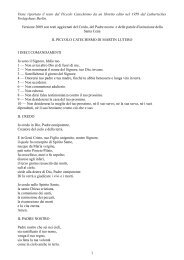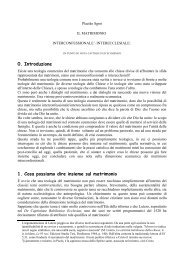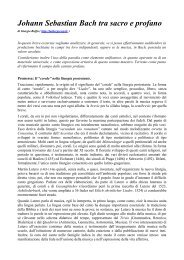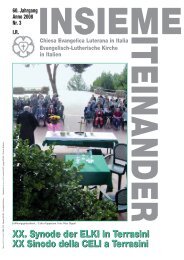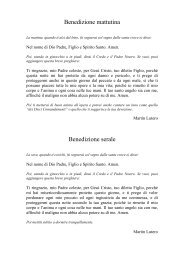Il dialogo ecumenico e interreligioso: quale futuro? - Nemesistemi
Il dialogo ecumenico e interreligioso: quale futuro? - Nemesistemi
Il dialogo ecumenico e interreligioso: quale futuro? - Nemesistemi
You also want an ePaper? Increase the reach of your titles
YUMPU automatically turns print PDFs into web optimized ePapers that Google loves.
priorità del mistero, cioè di lasciarsi proiettare al di là di se stessi 1 . E <strong>quale</strong> sarebbe la 'misteriosa<br />
eccedenza' che si avverte come mistero nel <strong>dialogo</strong>, dal ripiegamento fuori della comunione nel<br />
mistero di Dio e per non trovarsi "più severamente giudicati" 2 ? È la via che si apre al rinnovamento<br />
delle Chiese in Cristo: passaggio da una semplice ripetizione di se stessi alla "trasformazione di se<br />
stessi" tramite l'incontro con altri, nel <strong>dialogo</strong> 3 . <strong>Il</strong> <strong>dialogo</strong> rinnova nella misura in cui "ci s interroga<br />
insieme sulla fedeltà alla volontà di Cristo" 4 . Dal mistero di Dio 5 , o cioè di pensare ciò che non<br />
può essere pensato 6 , si apre la via paradossale verso la verità che non si percorre come una<br />
riflessione astratta (concettuale ) ma dalla stessa dinamica del <strong>dialogo</strong> tra soggetti in cammino e<br />
che nessuna conoscenza permette di circoscrivere o nella <strong>quale</strong> si potesse concettualmente<br />
inquadrarLo 7 . <strong>Il</strong> mistero non richiude una fede su se stessa ma l apre dialogalmente ad ogni intuito<br />
che si rende disponibile alla ricersa del divino, dimensione ultima di ogni scambio 8 . Se il mistero<br />
non può essere circoscritto,<br />
1<br />
Paolo VI, Litterae enciclicae "Ecclesiam suam", Città del Vaticano 1964 / in «Acta Apostolicae Sedis» 1964, n° 9-10: «9. Vi diremo subito,<br />
Venerabili Fratelli, che tre sono i pensieri, che vanno agitando l'animo Nostro quando consideriamo l'altissimo ufficio, che la Provvidenza, contro i<br />
Nostri desideri ed i Nostri meriti, Ci ha voluto affidare di reggere la Chiesa di Cristo, nella Nostra funzione di Vescovo di Roma, e perciò di<br />
Successore del beato Apostolo Pietro, gestore delle chiavi del regno dei cieli e Vicario di quel Cristo che fece di Pietro il primo Pastore del suo gregge<br />
universale. 10. <strong>Il</strong> pensiero che sia questa l'ora in cui la Chiesa deve approfondire la coscienza di se stessa, meditare sul mistero che le è proprio,<br />
esplorare a propria istruzione ed edificazione la dottrina, già a lei nota e già in questo ultimo secolo enucleata e diffusa, sopra la propria origine, la<br />
propria natura, la propria missione, la propria sorte finale, ma dottrina non mai abbastanza studiata e compresa, come quella che contiene il piano<br />
provvidenziale del mistero nascosto da secoli in Dio... affinché sia manifestato... per mezzo della Chiesa,(*) misteriosa riserva cioè dei misteriosi<br />
disegni divini che mediante la Chiesa vengono notificati; e come quella che costituisce oggi il tema più d'ogni altro interessante la riflessione di chi<br />
vuol essere docile seguace di Cristo, e tanto più di chi, come Noi e come voi, Venerabili Fratelli, lo Spirito Santo ha posto quali Vescovi a reggere la<br />
Chiesa di Dio(**)».<br />
((*) Gv 7,16. / (**) Cf Ef 3,9-10. )<br />
2<br />
CONCILIO ECUMENICO VATICANO II, Costituzione dogmatica "Lumen gentium", Città del Vaticano 1965, nº 14.<br />
3<br />
L. Vischer, Rapport, in «La documentation catholique», 1973 nº 1639, p. 830.<br />
4<br />
SECRÉTARIAT POUR L'UNITÉ DES CHRÉTIENS, Directoire oecuménique, in «Information service», 1967 nº 1, p. 6; CONCILIO<br />
ECUMENICO VATICANO II, Decreto "Unitatis redintegratio", Città del Vaticano 1965, nº 4, 6.<br />
5<br />
R. V. Schnucker, Neo-Orthodoxy History, in AA. VV., Elwell Evangelical Dictionary, in «Internet» 2004, mb-soft.com/believe/txc/neoortho.htm:<br />
«The methodological approach of the movement involved dialectical theology, theology of paradox, and crisis theology. The use of dialectical<br />
thinking goes back to the Greek world and Socrates' use of questions and answers to derive insight and truth. It was used by Abelard in Sic et Non,<br />
and is the technique of posing opposites against each other in the search for truth. Barth and the early leaders were probably attracted to the dialectic<br />
as the result of their study of Soren Kierkegaard's writing. For Kierkegaard, propositional truths are not sufficient; assent to a series of religious<br />
formulations or creeds is not enough. Kierkegaard believed theological assertions of the faith to be paradoxical. This requires the believer to hold<br />
opposite "truths" in tension. Their reconciliation comes in an existential act generated after anxiety, tension, and crisis, and which the mind takes to be<br />
a leap of faith. The neo - orthodox took the position that traditional and liberal Protestantism had lost the insight and truth of the faith. The nineteenth<br />
century theologians had taken the paradoxes of faith, dissolved their tension, used rational, logical, coherent explanations as a substitute, creating<br />
propositions, and thus had destroyed the living dynamic of the faith. For the neo - orthodox, paradoxes of the faith must remain precisely that, and the<br />
dialectic method which seeks to find the truth in the opposites of the paradoxes leads to a true dynamic faith. As an example of this consider the<br />
statement: "In the No found in God's righteous anger one finds the Yes of his compassion and mercy." Some of the paradoxes identified by the neoorthodox<br />
movement are the absolute transcendence of God in contrast with the self - disclosure of God; Christ as the God - man; faith as a gift and yet<br />
an act; humans as sinful yet free; eternity entering time. How is it possible to have a wholly other God who reveals himself? How is it possible for the<br />
man Jesus of history to be the Son of God, the second person of the Trinity? How can one speak of faith as God's gift and yet involve human action?<br />
How is it possible for humans to be simultaneously sinful and saved? How is it possible for eternity, which is apart from time, to break in on time? In<br />
struggling with these, the temptation is to rationalize answers and avoid the crisis of faith; but the neo - orthodox eschewed such a solution. It is only<br />
in crisis / struggling that one can rise above the paradox and be grasped by the truth in such a way as to defy rational explanation. Crisis is that point<br />
where yes and no meet. It is that theological point where the human recognizes God's condemnation of all human endeavours in morals, religion,<br />
thought processes, scientific discoveries, and so on, and the only release is from God's word. The neo - orthodox, in summarizing their methodology,<br />
used dialectics in relation to the paradoxes of the faith which precipitated crises which in turn became the situation for the revelation of truth».<br />
6<br />
J. Marsden, Review of The Paradoxical Vision: A Public Theology for the Twenty-first Century. By Robert Benne, in «Internet» 2004,<br />
www.firstthings.com/ftissues/ft9506/reviews/marsden.html: «Tinder, while less well known outside academic circles than Niebuhr or Neuhaus, may<br />
be the purest representative of the paradoxical vision. His much celebrated textbook, Political Thinking, is prefaced with this statement from Soren<br />
Kierkegaard: "The paradox is the source of the thinker's passion, and the thinker without a paradox is like a lover without feeling: a paltry mediocrity.<br />
The supreme paradox of all thought is the attempt to discover something that thought cannot think"».<br />
7<br />
K. Barth, Kirchliche Dogmatik, II, 1, Zürich 1975, S. 322-323: «Es ist das Paradoxon des Zusammenseins seiner Gnade mit unserer Verlorenheit,<br />
nicht das Paradoxon des Zusammenseins von zwei für uns logisch unvereinbaren Begriffen. Gerade in Anerkennung des wirklichen, des göttlichen<br />
Paradoxons werden wir Gottes Personsein und Gottes Absolutheit nicht nebeneinander stehen und nicht nebeneinander stellen in der Weise, wie wir<br />
es zur Beschreibung geschöpflicher Wirklichkeiten mit und ohne logische Widersprüche allerdings oft genug tun müssen, sondern werden wir uns<br />
daran halten, dass Gott sich uns als der, der er ist, nämlich als der Liebende und also als der Eine, als die Person offenbart hat und dass wir daneben<br />
nichts Anderes (sei es nun mit jenem logisch vereinbar oder unvereinbar), sondern in aller Aufmerksamkeit auf dessen einzigartige Eigenart Dieses<br />
und nur Dieses, mit allen Konsequenzen dieses Eine zu sagen haben: dieses Eine (dass er der Eine ist!) so, dass es dem entspricht, was er selber uns in<br />
seinem Wort darüber vorgesagt hat, wobei dann gewiss auch das, was mit 'dem Absoluten' gemeint sein könnte, zu Ehren kommen wird, aber gerade<br />
nicht so, als ob dies, dass er der Eine ist, da durch, dass er 'absolut' ist, als dialektisch begrenzt und ergänzt erscheinen würde, als müssten wir nun<br />
doch, um Gott zu bezeichnen, über seine Personalität und über seine Absolutheit hinaus in irgend einen leeren Raum weisen, als ob Gott erst dort, in<br />
der dialektischen Überwindung dieses Gegensatzes, wahrhaft und wirklich Gott wäre».<br />
8<br />
D. Goergen, Current Trends: The New Ecumenism, in «SPIRITUALITY TODAY», Winter 1982, Vol. 34, No. 4, pp. 350-361, etiam in Internet<br />
2006, http://www.spiritualitytoday.org/spir2day/823446goergen.html: «The mystery underneath the relationships of Judaism, Christianity, and Islam,<br />
however, is not only theological; it also has political implications today. One cannot talk about Jews, Christians, and Muslims, or Israelis, Arabs, and<br />
Westerners, without the awareness that our solidarity in faith has implications for our attitudes towards each other, for the ways we treat each other,<br />
and especially for the dilemma we find in the Middle East today. Our common ancestry makes the situation in Palestine, Israel, and Lebanon all the<br />
50



